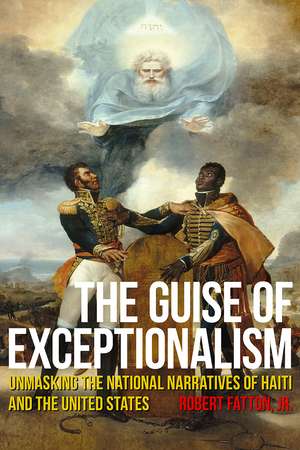The Guise of Exceptionalism: Unmasking the National Narratives of Haiti and the United States: Critical Caribbean Studies
Autor Jr. Robert Fattonen Limba Engleză Paperback – 16 apr 2021 – vârsta ani
The Guise of Exceptionalism compares the historical origins of Haitian and American exceptionalisms. It also traces how exceptionalism as a narrative of uniqueness has shaped relations between the two countries from their early days of independence through the contemporary period. Exceptionalism is at the core of every national founding narrative. It allows countries to purge history of injurious stains, and embellish it with mythical innocence and claims of distinction. Exceptionalism also builds the bonds of solidarity that forge an imagined national fellowship of the chosen, but it excludes those deemed unfit for membership because of their race, ethnicity, gender, or class. Exceptionalism, however, is not frozen. As a social invention, it changes over time, but always within the parameters of its original principles. Our capacity to reinvent it is dependent on the degree of hegemony achieved by the ruling class, and if this class has the infrastructural power to gradually co-opt and include €the groups it had once excluded.
Din seria Critical Caribbean Studies
-
 Preț: 283.84 lei
Preț: 283.84 lei -
 Preț: 247.29 lei
Preț: 247.29 lei -
 Preț: 203.79 lei
Preț: 203.79 lei -
 Preț: 243.85 lei
Preț: 243.85 lei -
 Preț: 245.73 lei
Preț: 245.73 lei -
 Preț: 185.09 lei
Preț: 185.09 lei -
 Preț: 318.70 lei
Preț: 318.70 lei -
 Preț: 334.71 lei
Preț: 334.71 lei -
 Preț: 210.64 lei
Preț: 210.64 lei -
 Preț: 204.10 lei
Preț: 204.10 lei -
 Preț: 253.93 lei
Preț: 253.93 lei -
 Preț: 314.72 lei
Preț: 314.72 lei -
 Preț: 346.99 lei
Preț: 346.99 lei -
 Preț: 262.40 lei
Preț: 262.40 lei -
 Preț: 316.89 lei
Preț: 316.89 lei -
 Preț: 366.32 lei
Preț: 366.32 lei -
 Preț: 361.12 lei
Preț: 361.12 lei -
 Preț: 370.28 lei
Preț: 370.28 lei -
 Preț: 362.28 lei
Preț: 362.28 lei - 23%
 Preț: 778.69 lei
Preț: 778.69 lei -
 Preț: 359.13 lei
Preț: 359.13 lei - 23%
 Preț: 779.76 lei
Preț: 779.76 lei -
 Preț: 251.36 lei
Preț: 251.36 lei -
 Preț: 186.75 lei
Preț: 186.75 lei - 10%
 Preț: 910.98 lei
Preț: 910.98 lei - 10%
 Preț: 910.98 lei
Preț: 910.98 lei -
 Preț: 267.04 lei
Preț: 267.04 lei - 10%
 Preț: 910.98 lei
Preț: 910.98 lei -
 Preț: 323.83 lei
Preț: 323.83 lei - 10%
 Preț: 910.98 lei
Preț: 910.98 lei -
 Preț: 359.04 lei
Preț: 359.04 lei - 51%
 Preț: 498.27 lei
Preț: 498.27 lei -
 Preț: 405.13 lei
Preț: 405.13 lei
Preț: 360.09 lei
Nou
Puncte Express: 540
Preț estimativ în valută:
68.91€ • 73.68$ • 57.45£
68.91€ • 73.68$ • 57.45£
Carte indisponibilă temporar
Doresc să fiu notificat când acest titlu va fi disponibil:
Se trimite...
Preluare comenzi: 021 569.72.76
Specificații
ISBN-13: 9781978821316
ISBN-10: 197882131X
Pagini: 246
Dimensiuni: 152 x 229 x 20 mm
Greutate: 0 kg
Editura: Rutgers University Press
Colecția Rutgers University Press
Seria Critical Caribbean Studies
ISBN-10: 197882131X
Pagini: 246
Dimensiuni: 152 x 229 x 20 mm
Greutate: 0 kg
Editura: Rutgers University Press
Colecția Rutgers University Press
Seria Critical Caribbean Studies
Notă biografică
ROBERT FATTON JR. is the Julia A. Cooper Professor in the Department of Politics at the University of Virginia in Charlottesville. He is the author of many books, including Haiti: Trapped in the Outer Periphery and Haiti's Predatory Republic: The Unending Transition to Democracy.
Cuprins
Contents
Preface and Acknowledgement
Chapter 1 Introduction
Chapter 2 American Exceptionalism
Chapter 3 Exceptionalism and “Unthinkability”
Chapter 4 Manifest Destiny and the American Occupation of Haiti
Chapter 5 The American Occupation and Haiti’s Exceptionalism
Chapter 6 Imperial Exceptionalism at the Turn of the Twentieth Century
Chapter 7 Dictatorship, Democratization, And Exceptionalism
Chapter 8 The Diaspora and the Transmogrification of Exceptionalism
Chapter 9 Identity Politics and Modern Exceptionalism
Chapter 10 Conclusion
Notes
Bibliography
Index
Preface and Acknowledgement
Chapter 1 Introduction
Chapter 2 American Exceptionalism
Chapter 3 Exceptionalism and “Unthinkability”
Chapter 4 Manifest Destiny and the American Occupation of Haiti
Chapter 5 The American Occupation and Haiti’s Exceptionalism
Chapter 6 Imperial Exceptionalism at the Turn of the Twentieth Century
Chapter 7 Dictatorship, Democratization, And Exceptionalism
Chapter 8 The Diaspora and the Transmogrification of Exceptionalism
Chapter 9 Identity Politics and Modern Exceptionalism
Chapter 10 Conclusion
Notes
Bibliography
Index
Recenzii
“In this engaging and lucid work, Fatton brilliantly analyzes and critiques ideologies of national exceptionalism. In the process, he demonstrates the interpretive power of comparison, urging us to re-think the intertwined futures of Haiti and the U.S. by refusing myths and narratives that distort their national histories.”
"In the era of Black Lives Matter and the mobilization of Black and Brown people to affirm their identity and belonging in America, Robert Fatton has successfully combined a transnational approach to offer the reader a new perspective on race relations, class and power in America in the twenty-first century."
"In this extraordinary book,Robert Fatton offers a trenchant comparative analysis of the ideology of exceptionalism as it was deployed in the United States and Haiti to extol the world-shaking revolutions that led to the first two independent nation-states in the New World, in 1776 and 1804, respectively."
"The Guise of Exceptionalism offers tremendous resources for thinking in complex terms about a world in which nationalism persistently takes on more dangerous and destructive expressions."
Descriere
The Guise of Exceptionalism compares the historical origins of Haitian and American exceptionalisms. It also traces how exceptionalism as a narrative of uniqueness has shaped relations between the two countries, from their early days of independence through the contemporary period. As a social invention, it changes over time, but always within the parameters of its original principles.
